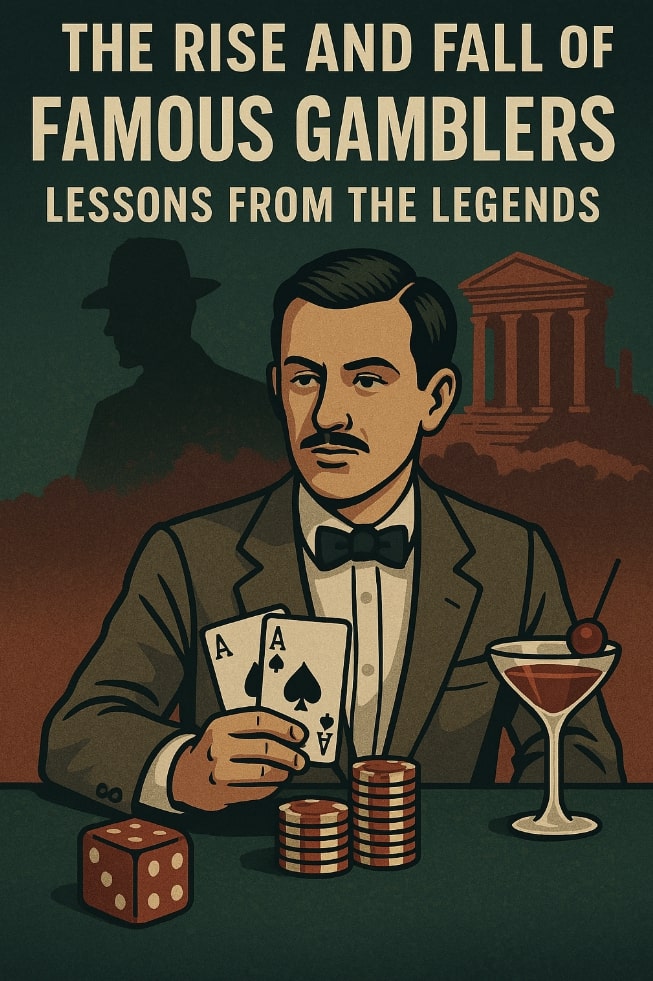Gambling has always held an undeniable allure—a world where fortunes can change on the turn of a card or the spin of a wheel. Throughout history, there have been gamblers who defied the odds, capturing imaginations with their dizzying highs and cautionary lows. From real money poker prodigies to roulette masters, their stories offer insights that go beyond luck and skill. These are tales of brilliance, hubris, fortune, and, ultimately, the consequences of pushing luck too far.
Archie Karas: The Man Who Flew Too Close to the Sun
In the early 1990s, Archie Karas embarked on what has since been called “The Run.” Arriving in Las Vegas with just $50 to his name, Karas transformed that humble stake into an astounding $40 million over two years. His rise was the stuff of legend—taking on poker’s biggest names, crushing them at the tables, then turning his attention to high-stakes pool and craps. For a time, it seemed as though Karas could do no wrong.
But what goes up must come down. Karas kept gambling, unable or unwilling to walk away. He began playing games where the house edge was insurmountable, believing his streak could continue indefinitely. In less than a year, he lost his entire fortune. Years later, his gambling habits even led to legal trouble.
Kara’s story goes to show that even the greatest winning streaks have an expiration date. The inability to walk away when you’re ahead can turn triumph into tragedy.

Stu Ungar: Genius Undone by Demons
If ever there was a gambler whose natural brilliance shone brightest, it was Stu Ungar. Known simply as “The Kid,” Ungar was a prodigy at gin rummy before moving into poker. He won three World Series of Poker Main Event titles, an accomplishment few have matched. Ungar’s ability to read opponents was second to none. Many believed that if poker were purely a game of skill, he would be unbeatable.
Yet for all his genius, Ungar’s personal life was a maelstrom of addiction and self-destruction. His drug abuse, combined with reckless gambling outside the poker room, drained his fortune multiple times. Despite a miraculous comeback in 1997 to win his third WSOP title, he could not overcome his personal demons. A year later, Ungar was found dead in a cheap motel room, broke and alone.
Ungar was undeniably talented, but success in gambling—or any pursuit—requires more than just skill. Without self-mastery, even the most gifted can fall.
Don Johnson: Outsmarting the Casinos
In 2011, Don Johnson did what most gamblers dream of—he beat the house at its own game. A corporate executive and expert in risk management, Johnson approached Atlantic City casinos when they were struggling to attract high-rollers after the 2008 financial crisis. By negotiating customized rules that reduced the house edge—such as better odds, fewer decks in play, and loss rebates—he gained a mathematical advantage.
Johnson wasn’t counting cards or cheating. He used cold, hard logic and a deep understanding of probability to win over $15 million from three casinos, including Tropicana and Caesars.
Johnson’s success wasn’t about luck; it was about preparation and exploiting opportunities that others overlooked. His story underscores the value of understanding the rules and tilting them in your favor, whether at a casino or in real life.
Charles Wells: Luck Can Run Out
In 1891, Charles Wells became famous as “The Man Who Broke the Bank at Monte Carlo.” Over a few days at the roulette table, Wells won millions of francs—at one point breaking the bank multiple times. His exploits inspired songs, headlines, and myths. Some believed he had discovered a secret system; others chalked it up to sheer luck.
But Wells was no wealthy gentleman gambler. He was a conman, funding his casino exploits with money from fraudulent schemes. Eventually, his luck ran out—both at the tables and in life. Wells spent years in prison and died penniless.
Wells’ fleeting fortune serves as a stark reminder that luck may offer temporary victories, but integrity and sustainability matter far more in the long run.
Kerry Packer: The Billionaire Who Bet Big
Australian media mogul Kerry Packer was one of the world’s wealthiest gamblers. Known for his monumental bets, he would wager millions in a single session and treat both victory and defeat with the same casual shrug. One famous tale involves a brash Texan oilman boasting about his wealth. Packer responded by pulling out a coin and offering to flip for $100 million. The oilman wisely declined.
Packer once lost $28 million in one night but didn’t flinch. He saw gambling as entertainment, not a means to earn a living—and he only bet sums he could afford to lose.
Packer’s ability to remain unfazed in the face of staggering losses highlights the importance of understanding your limits. Gambling responsibly means never wagering money you can’t afford to lose.
Edward Thorp: The Father of Card Counting
While most gamblers rely on instinct, Edward O. Thorp brought science to the table. A math professor, Thorp applied probability theory to blackjack and developed a groundbreaking card counting system. In 1962, he published Beat the Dealer, a book that revolutionized the game.
Thorp didn’t stop at the casino. He later applied his mathematical models to the stock market, achieving huge success in hedge funds. His methodical, disciplined approach made him one of the few gamblers to consistently beat the house over time and demonstrates that a well-researched, strategic approach trumps hunches and gut feelings.
Terrance Watanabe: The Whale Who Lost It All
In 2007, Terrance Watanabe, the former CEO of a multi-million-dollar family business, became Las Vegas’s biggest whale. Over the course of a year, he lost more than $200 million playing blackjack and baccarat, often while reportedly intoxicated. Casinos rolled out the red carpet, offering him free drinks, luxurious accommodations, and millions in perks to keep him playing.
Eventually, Watanabe accused the casinos of taking advantage of his vulnerable state, but the damage was done. His losses were among the largest ever recorded in Vegas history.
Watanabe’s catastrophic losses highlight the dangers of addictive behavior and unchecked gambling. Without limits and personal discipline, even the wealthiest can lose everything.
Conclusion: Luck May Be a Lady, but She’s Fickle
The lives of these legendary gamblers provide more than just tales of luck, fortune, and downfall. They reveal universal truths about risk, reward, and human nature. Whether it’s Archie Karas’s inability to quit while ahead or Edward Thorp’s calculated precision, each story teaches us something fundamental about how we approach chance—and life.
Gambling may seem glamorous, but beneath the bright lights lies a world where discipline, knowledge, and control often matter more than luck. The greatest lesson from these legends? Success isn’t about winning a fortune. It’s about knowing how to keep it—and when to walk away.




